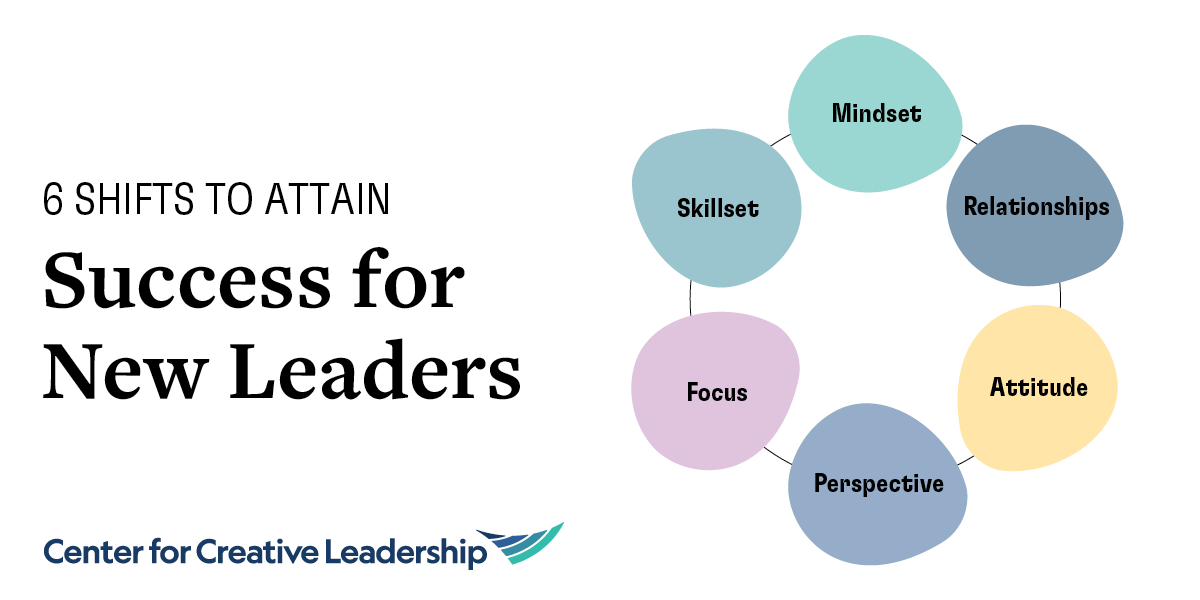Leadership Tips for First-Time Managers
Stepping into a management role for the first time isn’t just a change of task — it’s a fundamental shift of identity.
To be successful, new managers must transition from getting the work done themselves to getting the work done through other people. This requires a new level of self-awareness, an additional range of skills, and a new perspective that redefines success.
If you’re a new manager, your definition of success must now include the success of others. Rather than focusing on your own performance, you need to be considering questions such as:
- How does the group or team accomplish its work?
- Are they effective as individuals?
- Do they collaborate?
- Are team members committed and engaged?
- How are individual motivations and needs connected to the work and the organization?
You may find it counterintuitive that the “script” you’ve had in your head and relied upon until now — “my skills, my talents, and my technical knowledge have led to my success” — is no longer your ticket to success as a new leader. In fact, sticking to that same script will actually make you less effective as a new leader.
Learn how to be an effective boss by following our 6 leadership tips for first-time managers.
How to Become an Effective Boss
Make These 6 Shifts for Success In Your New Role
As a new leader, you want to become an effective boss. So, to succeed in your new role, shift the way you think and act in these 6 key areas:
- Mindset: You’re leading others now, not just yourself, so gather resources on how to do this effectively.
- Relationships: You’ll want to shift from the role of “friend” to the role of “boss” when at work.
- Attitude: You’ll need to delegate the work and not try to do it all anymore.
- Perspective: You’ll want to be sure you’re seeing the bigger picture.
- Focus: You’ll want to focus on what’s right, not what’s easy or self-serving.
- Skillset: You’ll want to develop new skills to manage your team effectively.
1. Shift your mindset.
Now is the time to become a more versatile leader. As a manager of others, you need to learn new ways of achieving results, because success isn’t about your individual contribution anymore. It’s about getting the best out of each direct report to meet the group’s goals. In this new role, versatility may be your best asset.
Being a versatile leader means that you can choose a range of responses to achieve results. Versatility requires you to open your eyes to your own preferences and behaviors, read others accurately, and learn a variety of tactics to deal with the most common challenges new managers face.
Take stock of your own strengths, weaknesses, and patterns — after all, who you are drives how you lead. Even though the emphasis is no longer on your individual performance, you need to understand your natural preferences and tendencies. The most effective way to lead others may not always be your default approach.
For example, you might be a person who thrives on the pressure of a tight deadline and, as an individual contributor, earned a reputation as someone who could roll up their sleeves and get the job done well, even at the last minute. But now, as a manager of others, using these same practices and preferences could lead to poor planning, micromanaging, or inadequate use of resources. If you assume everyone operates the same way you did as an individual contributor, you won’t see or leverage the array of talent on your team.
To be successful, you’ll want to have an open approach to learning new things. Our research has found that the most successful new leaders have a motivation to learn that comes from a belief that learning is fun, exciting, and engaging, and that far outweighs a motivation of rewards, recognition, and impressing others.
2. Shift your relationships.
Your former peers (some may even be your close friends) now directly report to you. Plus, you’re not just a team member. You now lead the team and should motivate others.
This shift from the role of “peer” to boss can be tricky. Former coworkers who were colleagues and friends will view you somewhat differently once you’re in a leadership position. Some helpful guidelines:
- Set clear expectations for friends and former coworkers.
- Treat team members fairly, but not necessarily equally, giving bonuses and raises based on merit, not favoritism.
- Build high-quality relationships with your subordinates, even those you don’t “click” with.
- Improve team cohesion by making roles and responsibilities clear and keeping track of each member’s progress.
Ineffective leaders have trouble making the switch from peer to boss because they haven’t shifted from focusing on personal relationships to focusing on the relationship they have with their team.

Discover the art, science, and practice behind learning and leading as a first-time manager with this research-based book filled with practical advice and lessons.
3. Shift your attitude.
Doing all the work by yourself is no longer the goal. Productive leaders drive team results by delegating tasks to direct reports. It’s not possible to do all the work yourself anymore. If you don’t, your team members will stagnate, productivity will slow, and the organization will suffer. Plus, delegating shows trust in your team.
You’ll want to shift the way you define, think about, and conduct work, too. Your job description now includes spending time on developing your employees (i.e., coaching and mentoring others). You’ll need to set goals for your team members, and give feedback to help them develop.
4. Shift your perspective.
New leaders face an abrupt change of perspective from “outsider” to “insider” when it comes to company politics. If you keep your perspective narrow and view politics as a chore, you won’t garner any of the benefits.
Instead, accept politics as a necessary part of the bigger picture of leadership. Increase your political savvy, and you’ll become an effective boss who’s more likely to be productive. We recommend you work with the system by:
- Gathering information about the thoughts, behaviors, and needs of coworkers and stakeholders.
- Observing what is appropriate behavior for each situation and acting on it.
- Connecting genuinely with a diverse group of people to gain new information and build support for your team’s — and stakeholders’ — goals.
5. Shift your focus.
With leadership comes responsibility — to act always based on what’s right, rather than what’s easy or self-serving. Both new and experienced leaders must understand that actions and decisions can have far-reaching consequences. So flip your focus and realize the importance of integrity and character, and doing the “right” thing in everything you do — even when you think no one is watching.
Consider how your words and actions could affect your team, the organization, and everyone involved. Developing integrity takes time and practice. We recommend:
- Consider carefully: When making important decisions, ask, “What would Mom (or other important figures in your life) think about this?”
- Be honest about what you can and can’t do — and when you can deliver.
- Don’t let anything cloud your judgment: Not a relationship, time pressure, or monetary rewards. Take yourself out of the equation to fully understand the consequences of any decision.
If you focus on integrity and build trusting relationships with your team, you’ll become a leader that everyone trusts and respects.
6. Shift your skillset.
Many new leaders struggle because they rely too much on technical skills that aren’t as necessary in the role of boss. So shift your skill set and work on enhancing key skills for leading others. Effective leaders work on their skillsets for team leadership:
- Communicate with others the way they want to be communicated with.
- Influence others to move work forward and gain support for decisions.
- Build and lead teams successfully.
- Develop others’ skills by assigning them challenging tasks and providing ongoing feedback.
Our research has found that if you rely solely on the technical expertise that landed you your promotion, you’re likely to be rated by others as less successful in your new leadership role.
Being better able to manage your own strengths and weaknesses, as well as seeking to understand the perspectives of others, will increase your odds of long-term success in your new role. You have the tools to encourage and model effective communication, seek solutions instead of blaming, give constructive feedback, and find ways to connect individual and organizational needs.
With these leadership tips for first-time managers and a foundation of these 6 key identity shifts, you’re more likely to be seen as an effective boss. Follow these guidelines, and watch your career take off.
Ready to Take the Next Step?
Ready to change your perspective as you learn how to be an effective boss? For more leadership tips for first-time managers, check out CCL Boost™ for New Leaders, an online tool that provides tactical support for the 6 shifts new managers must make.









